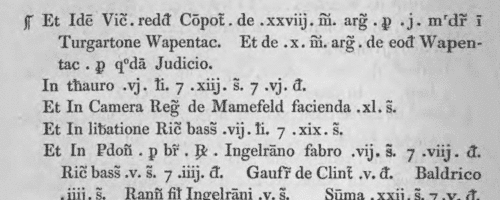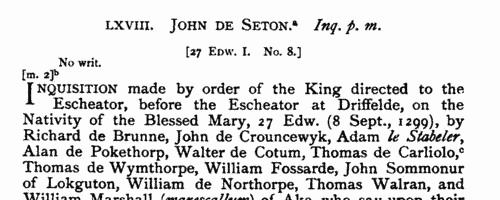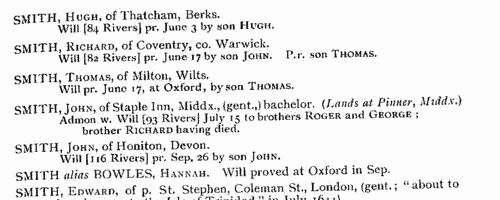Pin Surname Ancestry ResultsOur indexes 1000-1999 include entries for the spelling 'pin'. In the period you have requested, we have the following 13 records (displaying 1 to 10): Buy all | | | Get all 13 records to view, to save and print for £60.00 |
These sample scans are from the original record. You will get scans of the full pages or articles where the surname you searched for has been found. Your web browser may prevent the sample windows from opening; in this case please change your browser settings to allow pop-up windows from this site. Grantees of royal lands and pardons
(1129-1130)
The Great Rolls of the Pipe are the central record of the crown compiling returns of income and expenditure from the sheriffs and farmers of the various English counties or shires. This is the oldest series of public records, and the earliest surviving instances of many surnames are found in the Pipe Rolls. This is the earliest surviving roll, believed to be from the 31st year of the reign of king Henry I, that is, accounting for the year from Michaelmas 1129 to Michaelmas 1130: this is a period for which there are no other general English records, so these rolls give details of many persons and incidents otherwise utterly unknown. Most (but not all) of the entries in which names appear relate to payments for grants of land and pardons. There is a separate return in each year for each shire, the name of the shire being here printed at the top of each page. Wales was still independent, in separate kingdoms, at this period, and is not included, except for 'Herefordshire in Wales'. There is virtually no reference to the palatinates of Chester, Lancaster and Durham, or to Cumberland and Westmoreland in the far northwest.PIN. Cost: £4.00.  | Sample scan, click to enlarge

| Liberate Rolls
(1245-1251)
These chancery liberate rolls of the 30th to 35th years of the reign of Henry III of England record the details of payments and allowances as part of the administration of government. Most entries start with the Latin words 'liberate', meaning 'deliver', or 'allocate', meaning allow. There are also 'contrabreves', warrants mainly to sheriffs of shires, assigning them tasks and allowing expenses. Most of the entries relate to England and Wales, but there are occasional references to Ireland and the English possessions in France.PIN. Cost: £4.00.  | Sample scan, click to enlarge

| Yorkshire Inquisitions
(1294-1303)
Inquisitions post mortem are inquiries as to the real estate and heir of each person holding in capite or in chief, i. e. directly, from the Crown, or whose estates had been escheated or were in ward. The age and relationship of the heir are usually recorded. Inquisitions ad quod damnum enquired as to any activities (including maladministration by local officials) that had resulted in any material loss to the Crown. Proofs of age are inquiries into the precise date of birth of an heir, usually involving local inhabitants recalling those circumstances which fixed that date in their mind. Yorkshire inquisitions for this period were edited by William Brown for the Yorkshire Archaeological Society, and printed in 1902. This index covers all names mentioned, including jurors, tenants, &c. The volume also includes two stray inquests, from 1245 and 1282.PIN. Cost: £4.00.  | Sample scan, click to enlarge

| Clergy, the religious and the faithful in Britain and Ireland
(1342-1362)
These are abstracts of the entries relating to Great Britain and Ireland from the Regesta of popes Clement VI and Innocent VI, from the period when the papal court was resident at Avignon. Many of these entries relate to clerical appointments and disputes, but there are also indults to devout laymen and women for portable altars, remission of sins, &c. This source is particularly valuable for Ireland, for which many of the key government records of this period are lost. Clement VI was consecrated and crowned 19 May 1342 (the day from which his pontificate is dated); Innocent VI was crowned 18 December 1352 and died 12 September 1362. The extracts were made by W. H. Bliss and C. Johnson from Regesta cxxxvii to ccxliv, and published in 1897. The registers are almost complete for these two pontificates. At his accession, Clement VI promised to grant benefices to all poor clerks who should come to Avignon and claim them within two months of his coronation. As many as 100,000 are said to have come, and the register for the first year of his pontificate runs to twelve volumes.PIN. Cost: £4.00.  | Sample scan, click to enlarge

| Clergy, the religious and the faithful in Britain and Ireland
(1362-1404)
These are abstracts of the entries relating to Great Britain and Ireland from the Regesta of popes Urban V, Gregory XI, (Anti-Pope) Clement VII, Urban VI and Boniface IX, and the Lateran Regesta of Boniface IX. Many of these entries relate to clerical appointments and disputes, but there are also indults to devout laymen and women for portable altars, remission of sins, &c. This source is particularly valuable for Ireland, for which many of the key government records of this period are lost. Urban V was consecrated and crowned 6 November 1362 (the day from which his pontificate is dated); Gregory XI was crowned 5 January 1371; Clement VII 31 October 1378; Urban VI 18 April 1378; Boniface IX 9 November 1389 and died 1 October 1404. Until 1376 the papacy was in exile at Avignon. The extracts were made by W. H. Bliss from Regesta ccxlv to cccxx and Lateran Regesta i to xliii, and published in 1902. Bliss remarked that 'although the writing of the Papal Registers of the 14th century is clearer than that of many contemporary English MSS., the entries in them were for the most part founded upon petitions or letters from different countries, and the scribes in the Papal Chancery must have experienced even greater difficulty in copying English proper names than English students experience nowadays in reading the early Chancery Rolls preserved in the Public Record Office. Not having local or personal knowledge, they constantly misread doubtful letters.'PIN. Cost: £4.00.  | Sample scan, click to enlarge

| Norman Rolls
(1200-1417)
The dukedom of Normandy is one of the appendages of the English crown, but actual possession of the dukedom was actively contested by the kings of France. During the periods of English power records were kept for Normandy similar to those of the royal administration in England, with enrolment of letters and grants of liberties and privileges and confirmations of previous enjoyed rights. The rolls for 1200 to 1205 and during the reassertion of English rule under Henry V in 1417, were edited by Thomas Duffus Hardy for the Commissioners of the Public Records, and published in 1835. Most of the persons mentioned are French inhabitants of Normandy or Englishmen in France, but there is also a long section (from page 122 onwards) of valuation of lands of Normans in England, where English jurors, county by English county, attest to acreage, numbers of cattle &c.PIN. Cost: £4.00.  | Sample scan, click to enlarge

| PCC Probates and Administrations
(1648)
The Prerogative Court of Canterbury's main jurisdiction was central and southern England and Wales, as well as over sailors &c dying abroad: these brief abstracts, compiled under the title "Year Books of Probates", and printed in 1906, usually give address, date of probate and name of executor or administrator. They are based on the Probate Act Books, cross-checked with the original wills, from which additional details are, occasionally, added. The original spelling of surnames was retained, but christian and place names have been modernised where necessary.PIN. Cost: £2.00.  | Sample scan, click to enlarge

| Hertfordshire Sessions
(1658-1700)
Incidents from the Hertfordshire Sessions Books and Minute Books. These cover a wide range of criminal and civil business for the county: numerically, the the most cases (759) concerned not attending church; presentments about repairs to roads and bridges (247); unlicensed and disorderly alehouses (226); assault (156); badgers, higlers, &c., trading without licence (142); and trading without due apprenticeship (117). This calendar gives abstracts of all entries in the Sessions Books and Minute Books for Hertfordshire sessions for the period.PIN. Cost: £4.00.  | Sample scan, click to enlarge

|  Masters and Apprentices
(1737) Masters and Apprentices
(1737)
Apprenticeship indentures and clerks' articles were subject to a 6d or 12d per pound stamp duty: the registers of the payments usually give the master's trade, address, and occupation, and the apprentice's father's name and address, as well as details of the date and length of the apprenticeship. 1 January to 31 December 1737PIN. Cost: £8.00.  | Sample scan, click to enlarge

| Patentees of New Inventions
(1859)
Abstracts of British patents for new inventions applied for and granted from 1 January to 31 December 1859: giving date, name and address, and short description of the invention. It is then stated whether 'Letters patent sealed' or 'Provisional protection only'.PIN. Cost: £6.00.  | Sample scan, click to enlarge

|
| 1 | 2 |  |
Research your ancestry, family history, genealogy and one-name study by direct access to original records and archives indexed by surname.
|













